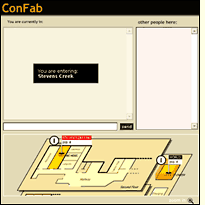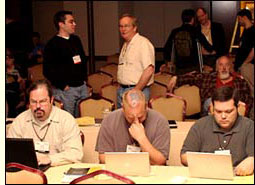One Conference, Two Worlds
April 27th, 2003 This week’s O’Reilly Emerging Technology Conference in Santa Clara, California was great fun. I enjoyed the presentations and the ideas, but it was the behavior of the attendees that really fascinated me.
This week’s O’Reilly Emerging Technology Conference in Santa Clara, California was great fun. I enjoyed the presentations and the ideas, but it was the behavior of the attendees that really fascinated me.
The conference wasn’t all “there.”
Much of it took place elsewhere, and everywhere — in cyberspace. My attention was always torn between the physical conference and the virtual conference.
I’ve never seen so many networked gadgets in use simultaneously in one place. During any given session, much of the audience had their laptops open and online thanks to power outlets and wireless Internet service throughout the conference rooms, lounges and hallways. I was immersed in bandwidth; I was surrounded by a chorus of whirring laptops and clicking keys.
For me, this was a totally new sort of event — but soon, experiences like this will become commonplace.
The typical scene: up front the speaker presents her talk, projecting a slide show or a demo onto the wall-sized screens. A glance around the darkened room reveals dozens of ghostly blue-white faces gazing into laptop screens.
 Many of them are engaged in online chat rooms. ConFab, a Web-based chat tool, was built just for the conference. It allows a person to mouse-over a map of the conference rooms, to specify which physical-world room he’s sitting in, to engage in text chats with other attendees, and to see how many people are logged into each conference room. He can even pay a virtual visit to another conference room to find out what people are chatting about over there.
Many of them are engaged in online chat rooms. ConFab, a Web-based chat tool, was built just for the conference. It allows a person to mouse-over a map of the conference rooms, to specify which physical-world room he’s sitting in, to engage in text chats with other attendees, and to see how many people are logged into each conference room. He can even pay a virtual visit to another conference room to find out what people are chatting about over there.
(Network problems made staying connected to ConFab very difficult. But people conferred in more traditional Internet Relay Chat rooms too.)
In the chat rooms people crack jokes and trade opinions about what the speaker is saying, and they write brief summaries of what’s going on for people who are tuned in to the conference from other parts of the planet.
People read other folks’ comments. They examine the speaker’s Web site. They tune in to chats going on simultaneously in the other conference sessions, judging whether to step out and join the session going on next door.
And they blog. I watched at least three people pull out digital cameras during presentations, take snapshots and upload the images to their blogs right there.
 People collaborate to take notes on the presentations and discussions using wikis. Groups of people use Hydra, a collaborative editing tool that allows multiple users to elegantly write, edit and add to a single document simultaneously.
People collaborate to take notes on the presentations and discussions using wikis. Groups of people use Hydra, a collaborative editing tool that allows multiple users to elegantly write, edit and add to a single document simultaneously.
That pattern was repeated endlessly throughout the conference. Everyone’s energies were divided between cyberspace and the physical world. This is a fascinating phenomenon, but when the novelty wears off will such connectedness make for better or worse conferences?
Did the average attendee go home with more or less knowledge, with more or fewer useful acquaintances, with more or less encouragement than they would have acquired without the digital networking? What do you think?
The conference left me more confused about these questions than ever. For one thing, I wasted a lot of my attention and energy dealing with a couple of basic technical problems that the organizers can easily iron out in time for next year’s conference. But next year, won’t my attention be devoted to a new set of problems to wrestle or configurations to fine-tune as more real-world subtleties slip by unnoticed?
I want to experiment more with this, and I know I won’t have to wait long.
(A freakish footnote: I’m writing this entry on my laptop in a Berkeley WiFi cafe, days after the conference ended. Three other geeks bend over three other laptops by the window. They’re talking about their experiences at the same conference, as they post entries to their own blogs about it. Should I laugh or cry?)
(Photos in this entry by Derrick Story of the O’Reilly Network.)
Very interesting! I wish I could have attended that conference, but it’s a long flight from Japan. I am particularly interested in your thoughts on the increased amount of interaction happening between participants at the conference. Do you think people got more or less out of there experience?
UltraBob
Here’s an interesting piece in The New York Times along these lines.
“The Lure of Data: Is It Addictive?”
http://www.nytimes.com/2003/07/06/business/yourmoney/06WIRE.html?pagewanted=1&ei=5062&en=027a31a06e611f55&ex=1058068800&partner=GOOGLE
Justing Hall wrote a much more in-depth and insigtful article about the same thing, regarding the following year’s ETech conference.